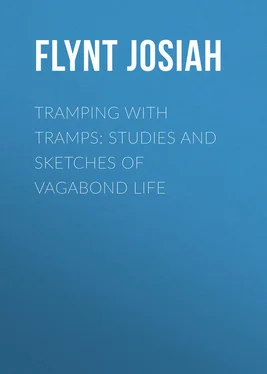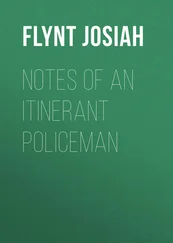Josiah Flynt - Tramping with Tramps - Studies and Sketches of Vagabond Life
Здесь есть возможность читать онлайн «Josiah Flynt - Tramping with Tramps - Studies and Sketches of Vagabond Life» — ознакомительный отрывок электронной книги совершенно бесплатно, а после прочтения отрывка купить полную версию. В некоторых случаях можно слушать аудио, скачать через торрент в формате fb2 и присутствует краткое содержание. Жанр: foreign_antique, foreign_prose, на английском языке. Описание произведения, (предисловие) а так же отзывы посетителей доступны на портале библиотеки ЛибКат.
- Название:Tramping with Tramps: Studies and Sketches of Vagabond Life
- Автор:
- Жанр:
- Год:неизвестен
- ISBN:нет данных
- Рейтинг книги:3 / 5. Голосов: 1
-
Избранное:Добавить в избранное
- Отзывы:
-
Ваша оценка:
- 60
- 1
- 2
- 3
- 4
- 5
Tramping with Tramps: Studies and Sketches of Vagabond Life: краткое содержание, описание и аннотация
Предлагаем к чтению аннотацию, описание, краткое содержание или предисловие (зависит от того, что написал сам автор книги «Tramping with Tramps: Studies and Sketches of Vagabond Life»). Если вы не нашли необходимую информацию о книге — напишите в комментариях, мы постараемся отыскать её.
Tramping with Tramps: Studies and Sketches of Vagabond Life — читать онлайн ознакомительный отрывок
Ниже представлен текст книги, разбитый по страницам. Система сохранения места последней прочитанной страницы, позволяет с удобством читать онлайн бесплатно книгу «Tramping with Tramps: Studies and Sketches of Vagabond Life», без необходимости каждый раз заново искать на чём Вы остановились. Поставьте закладку, и сможете в любой момент перейти на страницу, на которой закончили чтение.
Интервал:
Закладка:
The main reason why the criminal is afraid to go beyond the fifteen-year limit is that, after that time, unless he be an uncommonly clever man, he is likely to get what is called "the shivers" – one of the weirdest disorders to which the human body ever yields. Men describe it differently; but, by all accounts, the victim is possessed by such a terror of capture that each member of his body is in a constant tremor. Instances have been known where, owing to a sudden attack of this shivering palsy, he has had to quit a "job" that was almost finished. If these fits once become customary the man is unqualified for any kind of work ever after, and usually ends his life in the lowest class of the outcasts' world – the "tomato-can tramp class."
It is interesting to note where criminals draw the dividing-line between success and failure. Generally speaking, they consider a man fairly successful if between imprisonments he gets a "vacation," as they call it, of eight or ten months, and is lucky enough during this period to make sufficient "hauls" to compensate him for the almost inevitable punishment that follows. The understanding, of course, in all this is that he gets the benefit, either in carousals or more practical investments, of the money he has been lucky enough to win. As a rule, however, the plunder usually goes in debauches, and very quickly, too; but the criminal always hopes to recoup himself by a great stake which is to be put away in safety. If he be a man of average criminal wit and experience, particularly the latter, he can frequently secure the vacation of eight months for a number of years. But the more confinement he suffers the more reckless he becomes, and the less able to think carefully; and there are a great many men who soon find that even six months is the most that they can count on. This time, however, is not enough, as a rule, for the hauls necessary to offset the expected term in prison; and the criminal is usually clever enough to get out of the business. He then bids good-by to his more tenacious brethren and joins the tramp class, where he is made welcome by others who have joined it before him. He becomes a tramp because it is the career that comes nearest to the one he hoped to do well in. Besides affording considerable amusement, it also permits the discouraged man to keep track of the comrades whom he used to know in the higher walks of outlawry; and this is an attraction not to be overlooked.
It is usual to classify the criminal according to the crimes he commits. One classification, for example, makes murderers the least intelligent; vagabonds, sexual offenders, and highwaymen a little more so; while the fraudulent class, pickpockets and burglars, are accounted the most gifted of all. I think this a fair division and one that will generally hold good; but I have found that criminals who commit crimes against property, or the fraudulent class, are far and away in the majority. Their native intelligence will compare favorably with that of the average run of people; and I have been unable to discover any mental defects until they have been a long time in prison. Nearly all of them can read and write very well indeed; and there are many who have read far more than the ordinary business man. I have met men, very low-born men too, who, while in prison, have read through more volumes of philosophy and history than even the usual college student can boast in his reading; and they have been able to converse very wisely on these subjects. These same men have acquired the rudiments of their studies in reformatory and industrial institutions, and have succeeded in continuing them in the libraries of penitentiaries. I know one criminal who in his prison-cell informed himself about a branch of chemistry simply for purposes of business: he was thought at the time to be more or less crazy.
Prison officials are often deceived by criminals in regard to their acquirements in learning. In many prisons, diligence and progress in study earn as much promotion as general good conduct does; and as the average prisoner has every reason to desire the benefits which promotions bring with them, he tries after a fashion to progress. But what is this fashion? Very frequently this: On his arrival at the prison, instead of telling the truth to the officials who quiz him about his abilities, he says that he does not even know the alphabet, and is consequently given very light mental work. He is thus able to advance rapidly, and his teachers pride themselves on his quickness to learn and their ability to teach. Ere long he gets into a better class, and so on until he has enjoyed all the benefits which precocity can earn. There are other men who profess ignorance in order to appear simple and unknowing, and thus create the impression that they are not so guilty as they are taken to be. Many times and in many cases the criminal is a little cleverer than the people who are examining him; and one cannot set a high value on statistics concerning his intelligence. If the student of criminology could and would eavesdrop for a while at some "hang-out" in the open, and hear the criminal's own account of the way he is investigated, he might learn "foxier" methods of dealing with his subject.
One other fact belongs properly to this division: The professional criminal is not, in his own class, the revolutionary creature that he seems when preying upon the classes above him. His attitude toward society in general is without doubt disrespectful and anarchistic, and it is usually immaterial to him what happens to society as such, so long as he can make a "stake"; but in his own environment he is one of the most conservative of human beings. There is no class, for instance, where old age and mature opinion receive more respect and carry more weight; and, as a general thing, the young men in it – the radical element – are expected to take a back seat. At a hang-out gathering they must always show deference to the older men, and nothing is so severely judged as "freshness" on their part.
I think this is a characteristic of the criminal that might be turned to good account if he should ever be won over to respectable living: in affairs of the State, provided he had a fair share of this world's goods, he would be found invariably on the conservative rather than on the radical side.
IV
I come now to the question of the criminal's moral responsibility. Can he be held definitely answerable for his evil-doing, or is he morally insane and unable to distinguish between right and wrong? The instinctive criminal must be irresponsible, and his treatment should be such as we give to insane people. As I know him, he cannot help his criminal actions; it is in him to do them; and the only merciful thing is to put him where he at least cannot continue his depredations on society, and where, if cure be possible, he may be in the hands of specialists best fitted to help him. But, as I said at the outset, he is not the sort of criminal that I have found in largest numbers in the open. It is the commercial criminal that predominates there; and, as a rule, he can be held responsible for his evil-doing.
It is often said that his lack of remorse for his crimes proves him to be morally incompetent; but this opinion is founded on insufficient knowledge of his life. He has two systems of morality: one for his business, and the other for the hang-out. The first is this: "Society admits that the quarrel with me is over after I have served out my sentence; and I, naturally enough, take the same view of the matter. It is simply one of take and pay. I take something from society and give in exchange so many years of my life. If I come out ahead, so much the better for me; if society comes out ahead, so much the worse for me, and there is no use in whimpering over the transaction." So long as he remains in the business he thinks it only fair to "stick up for it"; and he dislikes and will not associate with men who denounce it in public.
Читать дальшеИнтервал:
Закладка:
Похожие книги на «Tramping with Tramps: Studies and Sketches of Vagabond Life»
Представляем Вашему вниманию похожие книги на «Tramping with Tramps: Studies and Sketches of Vagabond Life» списком для выбора. Мы отобрали схожую по названию и смыслу литературу в надежде предоставить читателям больше вариантов отыскать новые, интересные, ещё непрочитанные произведения.
Обсуждение, отзывы о книге «Tramping with Tramps: Studies and Sketches of Vagabond Life» и просто собственные мнения читателей. Оставьте ваши комментарии, напишите, что Вы думаете о произведении, его смысле или главных героях. Укажите что конкретно понравилось, а что нет, и почему Вы так считаете.












